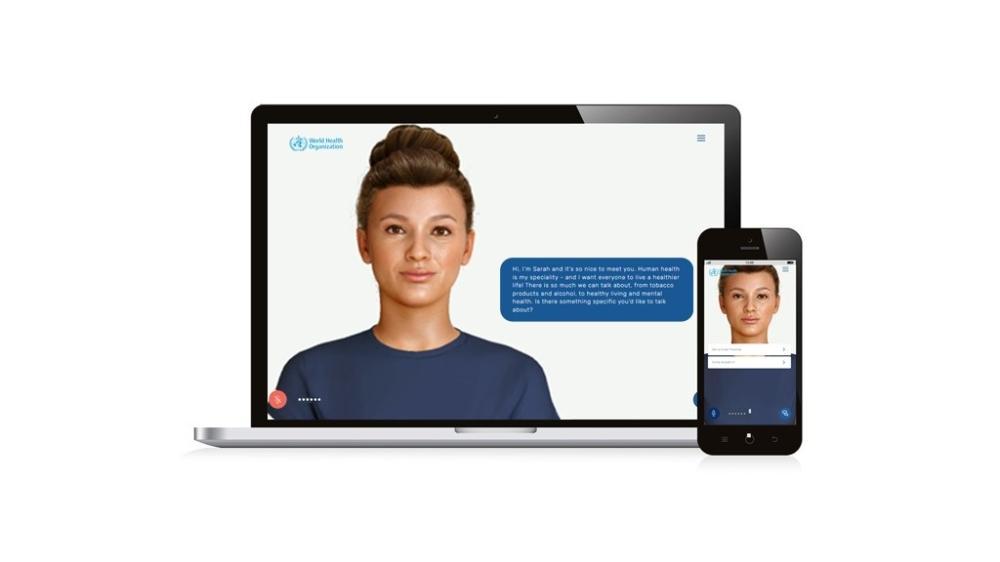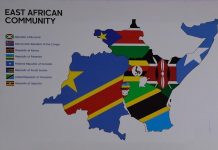Africa-Press – Rwanda. Technology integration across the health sector is on the rise, and the evolution is just beginning with the introduction of S.A.R.A.H. This new digital health promoter prototype boasts advanced empathetic response capabilities driven by generative artificial intelligence (Gen AI).
Developed by Soul Machines, a company with bases in San Francisco, US and New Zealand, in collaboration with Rooftop, a South African creative firm, S.A.R.A.H., which stands for “Smart AI Resource Assistant for Health,” has been officially endorsed and launched by the World Health Organization (WHO) as part of World Health Day on April 7, aiming to promote universal access to quality health services, education, and information.
This digital health promoter represents progress in AI-driven health information avatars, utilising cutting-edge technology and language models. It operates around the clock in eight languages (English, French, Spanish, Chinese, Portuguese, Russian, Hindi, and Arabic), offering health guidance on diverse topics across multiple devices.
To understand how it’s built, operates, and what WHO envisions, here are five key details about this health-focused virtual assistant:
It’s a digital person
A human-like character created by blending computer-generated imagery with artificial intelligence to form a fully autonomous personality. Unlike a chatbot, you can engage with this visible person in lifelike and authentic conversations.
S.A.R.A.H. is a creation of “Digital People,” developed with Soul Machines Studio, utilising artificial neural networks that mimic the human brain’s models and sensory networks to build a virtual central nervous system known as an “Artificial Human”.
Digital humans possess the ability to interact, learn, and express themselves in ways that resemble human behaviour. Their unique personalities and emotional intelligence allow them to perceive facial expressions and emotional cues from their human counterparts, adjusting their responses accordingly. This AI-driven capability enables digital humans to continually learn and enhance their ability to engage realistically.
For a digital person like S.A.R.A.H. to interact with you authentically, her “Digital Brain” requires information about your expressions. That’s why, when you visit Sarah’s landing page, you grant access to your device’s microphone and camera to enable this interaction.
As a digital person, S.A.R.A.H. doesn’t make judgments or offer tailored advice but serves as a link to access real resources online.
It’s powered by cutting-edge Gen AI
S.A.R.A.H., the digital health promoter, has been countering Covid-19 misinformation since the start of the pandemic. It leverages GPT (Generative Pre-trained Transformer), a neural network machine learning model trained on extensive internet data to generate various types of text. Soul Machines, the creator, uses the Davinci model of GPT, which has been trained with the latest insights from the World Health Organization and trusted partners.
Sarah, or S.A.R.A.H., operates on generative AI rather than a pre-set algorithm or script. This approach allows her to provide real-time, accurate responses, engage in personalised conversations resembling human interactions, and deliver nuanced, empathetic responses in a non-judgmental manner.
Designed to provide information on living healthier!
Focusing on topics like tobacco and e-cigarettes, mental health, healthy eating, and physical activity, WHO’s digital health promoter is trained to deliver information on key health topics, including healthy habits and mental wellness. This empowers people to optimise their health and well-being journey, regardless of their location.
Sarah can assist individuals in understanding risk factors associated with leading causes of mortality globally, such as cancer, heart disease, lung disease, and diabetes. She provides access to up-to-date information on topics like tobacco cessation, physical activity, nutrition, stress management, and more.
During a conversation with Sarah, I posed a question offering three alternatives for someone experiencing suicidal thoughts—suicide, seeking help, or waiting for the urge to pass. Sarah elaborated on why seeking help is crucial and suggested resources available in WHO’s directory for immediate support.
It’s just the beginning
“The future of health is digital, and supporting countries to harness the power of digital technologies for health is a priority for WHO,” stated WHO Director-General Dr Tedros Adhanom Ghebreyesus. For Ghebreyesus, Sarah represents just the first of many AI tools that will be released in the coming years.
“S.A.R.A.H. gives us a glimpse of how artificial intelligence could be used in the future to improve access to health information in a more interactive way. I call on the research community to help us continue to explore how this technology could narrow inequities and help people access up-to-date, reliable health information.”
According to a press release, “WHO is committed to continuing research on this new technology to explore potential benefits to public health and better understand the challenges. While AI has enormous potential to strengthen public health, it also raises important ethical concerns, including equitable access, privacy, safety and accuracy, data protection, and bias.”
Not 100% reliable
S.A.R.A.H., the project aims for continuous learning and development of a prototype that can provide reliable, responsible, and accessible information. According to WHO, “By using Sarah, you understand and agree that you should not rely on the answers generated as the sole source of truth or factual information, or as a substitute for professional advice.”
This caution is due to the use of Generative AI to deliver health messages based on available data, which means that answers may not always be accurate and are based on patterns and probabilities in the available data. For real, accurate, up-to-date information, users can still access the WHO’s website.
For More News And Analysis About Rwanda Follow Africa-Press






